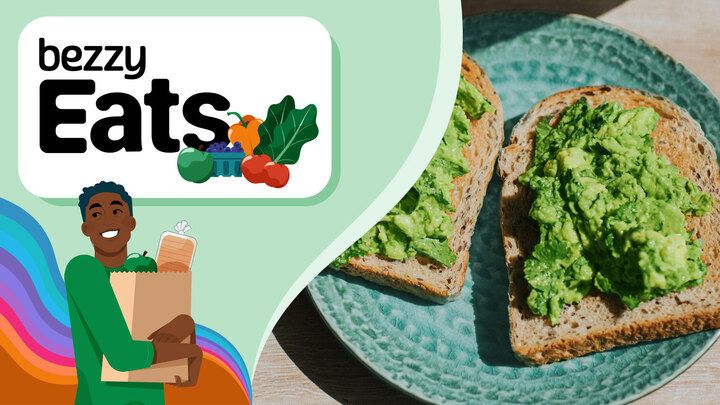6 Anti-Inflammatory Breakfasts to Start Your Day
January 19, 2024
Content created for the Bezzy community and sponsored by our partners. Learn More

Eating antioxidant-rich foods can help reduce inflammation and kickstart your morning. Here’s how.
If there’s one thing most of us could use less of, it’s inflammation.
Exercising and getting adequate sleep can help, and what we eat also makes a big difference. But it can feel overwhelming to sift through endless advice about what foods to choose online and on social media.
To keep it simple, the foods we fuel our bodies with can either cause or lower inflammation. Here’s what to know about diet and inflammation, along with some healthy breakfast ideas.


What foods affect inflammation?
Foods that cause inflammation include red and processed meat, commercial baked goods, white breads and pasta, fried foods, and foods and drinks made with added sugar.
On the other hand, antioxidant-rich fruits and vegetables, omega-3 fatty acid fish (like salmon), probiotic-packed dairy products, as well as nuts and seeds have anti-inflammatory properties that you could get more of in your diet.
One of the most powerful ways to start your day is with an anti-inflammatory breakfast.
A typical American breakfast includes carb-rich foods like cereal and pastries that are filled with sugar. Bacon and sausage are also popular options packed with saturated fat.
Making simple swaps with anti-inflammatory whole foods can set the stage for a day of healthy eating — and still be delicious.
6 anti-inflammatory breakfast ideas
Here are six quick breakfast recipes for kickstarting your morning.
1. Plain yogurt with berries and honey
Yogurt contains calcium, magnesium, monounsaturated fatty acids, and probiotics that may lower inflammation. A 2021 study indicates an association between consuming yogurt and lower inflammatory markers.
But more research is needed to understand how yogurt affects inflammation, and not all yogurt is created equal.
Opt for unflavored Greek yogurt over flavored yogurts filled with added sugar. Greek yogurt is high in protein, and you can drizzle honey on top for a hint of sweetness.
Honey also boasts plant compounds called polyphenols and a host of antioxidants, which neutralize damaging free radicals in the body.
Berries are chock-full of antioxidants that may help reduce inflammation. Topping your bowl with blueberries, blackberries, and raspberries will add flavor and another anti-inflammatory boost to your morning.
Frozen berries can be an affordable, convenient way to keep the fruit on hand.
2. Vegetable omelet
Any opportunity to add more veggies to your plate is a good one. A vegetable omelet (or scrambled eggs with veggies) allows you to do just that. Rich in fiber, antioxidants, vitamins, and other phytochemicals, vegetables have anti-inflammatory properties.
What’s more, eggs are one of the healthiest foods on the planet. They’re filled with vitamins, minerals, high quality protein, and healthy fat. They’re also rich in antioxidants lutein and zeaxanthin, which help protect eye health from macular degeneration and cataracts.
The sky’s the limit for the combinations you can create, from spinach and mushroom to zucchini and tomato. You can also meal prep egg bites and store them in the freezer for a no-mess breakfast on the go.
3. Avocado toast
Good thing avocado toast is still trendy. Avocados are full of monounsaturated fatty acids, which are an important part of an anti-inflammatory diet.
These fruits also contain prebiotic fiber, which supports a healthy balance of gut bacteria, which also plays a role in body-wide inflammation.
Smash avocado (or store-bought guacamole, if you’re short on time) atop slices of toasted whole-grain bread, which has more fiber than white bread. For more flavor, squeeze lemon juice on top and sprinkle with salt before eating.
Pro Tip: Swap regular salt for bagel seasoning.
4. Cottage cheese with walnuts and pears
Another trendy ingredient that makes an anti-inflammatory breakfast: cottage cheese.
Beloved by social media, it’s high in protein, packed with nutrients, and versatile to use. If your cottage cheese brand is fermented, it will also contain probiotics, which can help quell inflammation.
Cottage cheese pairs well with antioxidant-rich fruits, like pears, and walnuts can add a satisfying crunch. Walnuts also contain polyphenols that help protect against oxidative stress and inflammation.
5. Berry smoothie
Good things happen when you whirl together berries in a blender. Beautifully hued berries like strawberries, raspberries, and blueberries are packed with inflammation-fighting antioxidants.
Berries can also help improve blood pressure and glycemic management.
What’s more, a 2021 study suggests that our bodies can better absorb the antioxidant lutein from spinach when it’s liquified in juices and smoothies.
For a peanut butter and jelly flavored smoothie that checks all the boxes, add frozen berries, spinach, your preferred milk or plant-based milk, protein powder, and nut butter in a blender.
You can create a filling blend of carbohydrates, protein, and healthy fats in just one glass. Check out our guide for building a balanced smoothie.
6. Chia pudding
Chia seeds readily absorb liquid, and they’re full of fiber, polyphenols, antioxidants, omega-3 fatty acids, vitamins, and minerals. Chia seeds also help digestion, lower blood pressure, and improve blood sugar management.
To make chia pudding, simply stir together chia seeds and milk (dairy or plant-based), and refrigerate until it develops the consistency of pudding. When it’s ready, top with nuts, seeds, and fruit. Dig in!
Medically reviewed on January 19, 2024
8 Sources


Like the story? React, bookmark, or share below:
Have thoughts or suggestions about this article? Email us at article-feedback@bezzy.com.
About the author